How many guitars do you really need, and why more is not always better
A guitar collector has an existential crisis
I have owned about 40 guitars over the years. Today, there are 10 left—divided equally between those I regularly play and my little “collection.” Like most guitarists, I would have answered the question, “How many guitars is enough?” with a clear “One more than I already have.” until recently. But is more really better? Or could the number of instruments start interfering with your ability to be a good guitarist?
Originally published at Gearnews.de by Jan Rotring. Translation by Julian Schmauch.
Guitars are my absolute passion. I don’t just love the electric guitar as a musical instrument and a means of creative expression. I also like it as an object: the combination of wood, simple electronics, and maximum precision fascinates me. But if you look at it soberly, the guitar is, first and foremost, a tool, and we should use it to make music. So one evening, I sit in my little studio and look around — the beginning of a (small) existential crisis.
What awaits you in this article “How many guitars do you really need?”
Too many? Or not enough?

There they all are: dutifully standing on shelves, lying in boxes, hanging on the wall. There’s also one (or two) in the living room and in the rehearsal room, but I need them there, too.
The purely practical benefit of having lots of different guitars is also quite obvious. Whenever the creative spark ignites in my home (rarely), there’s always an instrument within reach, and I can start tinkering with the idea.
And yet, I quickly reach my limits — on the one hand, this may be due to my musical abilities. On the other hand, there’s always the thought: “Yes, yes, but I should play that on the Les Paul”. Then, the thought turns away from the product and towards the endless possibilities. And that’s usually the end of my creativity because it’s also clear that this one guitar that I absolutely (urgently, urgently, oh my God GAS!) have to have is missing.
To put it in a nutshell, my drastic reduction in owning guitars is related to this very hamster wheel. I approached the question of how many guitars it makes sense to own from a different angle and took a more analytical approach.
How many guitars do I really need – the situation
At the very beginning of my cleaning up, I want for two categories – Playing and Collecting. Of course, there may be some overlap, but basically, I’ve divided them into guitars I play (regularly) and guitars I want to own for emotional reasons.
To tell you a bit about what I own: Two Les Pauls (’87 and ’79), a cheap Ibanez (my first electric guitar), an Explorer, and a Firebird are the guitars I wish to keep, own and inherit at some point. Not really an investment, but it’s going in that direction.
The players are two Les Pauls (’87 and ’93), an Epiphone Semi-Hollow, an old Squier Telecaster (Japan!) and a Takamine acoustic. Yes, I’m aware that there’s no Strat. For my part, I’m generally too lazy for tremolo systems and have never been able to make friends with the classic Strat.
Which guitars are important. And why.
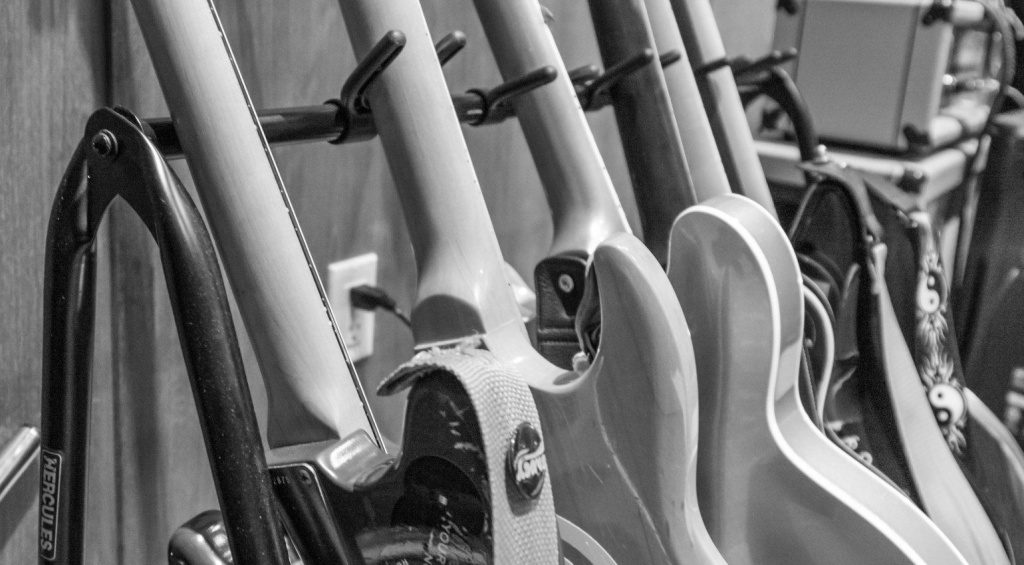
Of course, the whole decision-making process wasn’t as simple as I made it out to be. While I knew what had to stay with my collection (because I care about the individual guitars) early on, I took a more analytical approach when it came to the players.
Of course, you can play any style of music with the same guitar. But it’s not always that cool, to be honest. But more about that later. My line-up is musically based:
- A guitar for your genre: For me, it’s usually in the direction of Metal, Punk, Rock, etc. So: Humbucker.
- An alternative for your genre in a different tuning: I have both my Les Pauls tuned in standard and Eb, respectively
- An instrument with the widest possible sonic range: Telecaster – always works.
- An entirely different sound: For me, a semi-hollow guitar. Baritone guitars etc. are also possible.
- An acoustic guitar: Even as an electric guitarist, writing on acoustic is quicker and easier. In addition, acoustic parts can be played more credibly?
Why just one guitar is not enough & how many guitars do you really need?
Of course, you could also take a minimalist approach and just play a really flexible guitar. That worked quite well for Brian May, with a few exceptions. How many guitars does he really need?
But I can see three major drawbacks. Firstly, the need for different tunings is undeniable. And when you add a tremolo to the mix, it can get annoying.
Secondly, I have found that different guitars result in different songs. Occasionally, a change from A to B is helpful. As long as it doesn’t go from C, D, and E to X. Some guitars have different songs in them than others.
Finally, the differences in timbre are great for adding polyphonic layers or quick changes to a song. Of course, you can do this with the right effects units, but it’s much less stressful when you’re just making quick changes.
How many guitars should I own?

Now I’ve explained my own thoughts. But what do you get out of it? First of all, food for thought, of course. And here, we have a few lessons you can apply to your own collection. How many guitars do you really need? Warning, maximum personal opinion:
- 5 guitars are the sweet spot between variance and the roadblock to creativity.
- Focus on your preferred musical genre and prioritize two axes in your two most common tunings
- Invest in a really good all-rounder guitar (e.g. Fender Telecaster, Stratocaster or Gibson SG)
- Own at least one differently constructed instrument (e.g. semi-hollow instead of solid body or vice versa)
- An acoustic guitar (steelstring with a good pickup, e.g., Takamine, Martin, Gibson, etc.) definitely belongs in every player’s rack.
All of these tips apply to the home guitarist who alternates small gigs with rehearsals and recording sessions. If you tour the world regularly, other rules may apply.
10 classic guitars that always work
If you are still looking for suitable instruments for your player’s corner, here are a few suggestions. Most of the models are decades old and still in the eternal top 10 guitar models for good reason:
Gibson SG: Introduced in 1961 as the successor to the Les Paul, the Gibson SG’s lightweight, slim design and double cutaways make it perfect for almost anything. Two humbuckers deliver enough power to hold their own in rock and metal. It’s also great for blues and jazz—the perfect all-rounder.
Gibson Les Paul: My absolute favorite. Iconic design, two humbuckers with simple 3-way electronics. At the same time, it is so versatile that no genre can do without it.
Fender Stratocaster (Strat): Three single coils, a tremolo system, and two deep cutaways make the Strat a great solo guitar. The bright, crisp pickups are particularly at home in classic blues, rock or country settings. Depending on the pickups, more is possible!
Fender Telecaster (Tele): The first mass-produced solid body electric guitar, the Telecaster was introduced in 1950. Its two single-coil pickups make it perfect for country and rock music. Think Keith Richards, Bruce Springsteen or Jimmy Page.
Gibson ES-335: A semi-hollow guitar with a warm, resonant sound. Its iconic shape and versatile tone have made it a favorite of artists such as B.B. King and Johnny Marr (The Smiths). It also works perfect as an alternative to a solid body for double tracking.



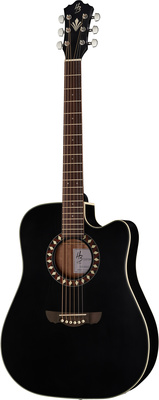

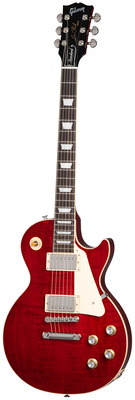

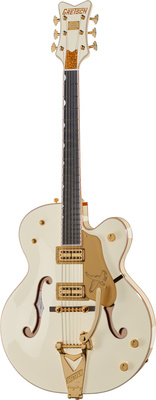


Gibson Explorer: Introduced in 1958 as a jazz instrument, the Explorer is known for its futuristic, angular design. With two humbuckers, it has a powerful tone and is popular with hard rock and metal guitarists such as Metallica’s James Hetfield.
Fender Jaguar: Shorter scale length and a unique circuit system offer a wide range of tones. It was particularly popular in the indie and alternative rock scene of the 1990s, played by the likes of Kurt Cobain and (again) Johnny Marr.
Ibanez RG: The ultimate lightning-fast guitar, its super-slim neck profile makes it ideal for fast, technical playing styles. Thanks to its high-output pickups, it is often played by metal and shred guitarists (e.g. Paul Gilbert).
Gretsch White Falcon: Looking for something a little more extravagant? The White Falcon is a luxurious, large hollow-body guitar with gold-plated hardware and a full, warm sound. It is THE symbol of Rockabilly and has been played by the likes of Chet Atkins and Neil Young.
Dreadnought Acoustic Guitar: Even if you are an electric guitarist, an acoustic guitar belongs in your rig. Whether it’s for testing out quick ideas, writing songs, or just relaxing on the sofa. A dreadnought with pickups is the absolute classic: enough punch for acoustic concerts, a comfortable body size and a mature sound. Multiple pickups make it perfect for live or studio use.





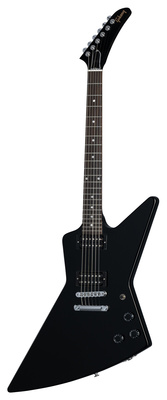

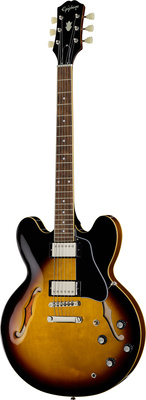


How many guitars do I need – how many guitars do you need?
In addition to personal considerations, your budget, emotional references, and practical considerations are beneficial in answering this question. Cost, maintenance, care, space requirements, repairs – all of these factors argue in favor of a minimalist approach. Which instruments end up in your rack depends on personal needs (musical), preferences (emotional), and your approach (musician vs. collector).
And now, the big question for you: Which guitars are for you? How many guitars do you own? And why? We’re looking forward to your comments!
More on Fender and Gibson
*This post about “how many guitars do you really need” contains affiliate links and/or widgets. When you buy a product via our affiliate partner, we receive a small commission that helps support what we do. Don’t worry, you pay the same price. Thanks for your support!
15 responses to “How many guitars do you really need, and why more is not always better”


 4,0 / 5,0 |
4,0 / 5,0 | 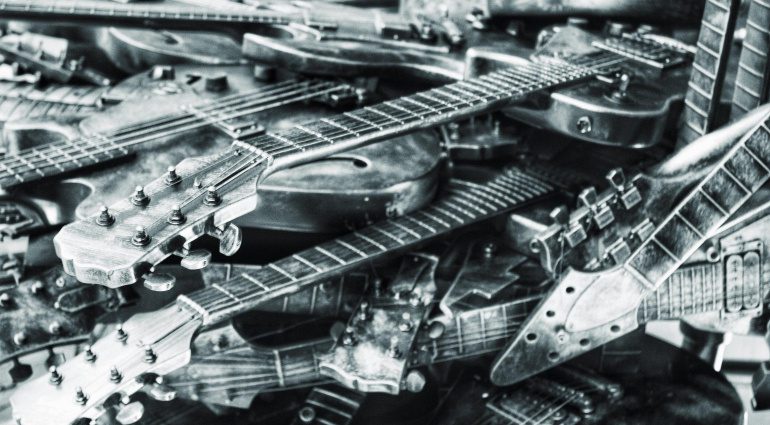


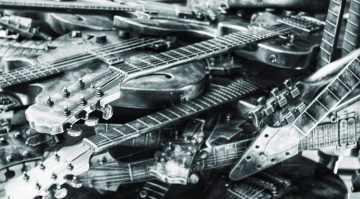

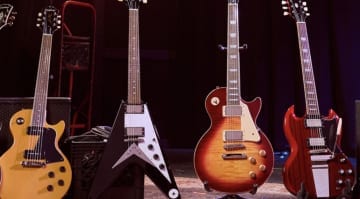
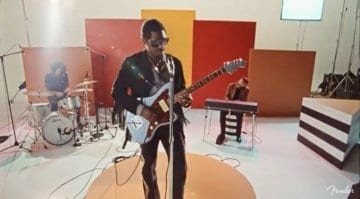
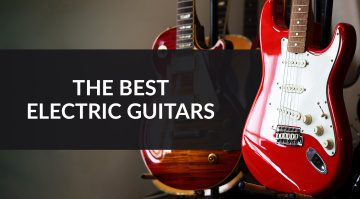
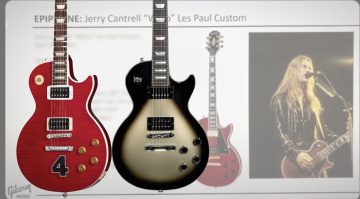
The only good answer is one.
Even if you play many different genres, there are pickup configurations that will cover all basis.
(also, let’s be real, the guitar isn’t the most significant part of the sound chain… you can play any genres on any guitar with an EQ on your pedalboard)
The only good answer is one more. 😉
If I could have only one, it would be my shell pink HSS Strat with roasted maple neck and board, medium-jumbo frets, retro-fitted high-pass filter, and decked 2-point trem. More covered in that package than any other.
But I want all nine of the Fenders, Squiers and Charvels (plus a Little Martin) that I own, and more.
My genres are blues. classic rock, alt country. alt rock, reggae and funk. I rarely, if ever, use alternative tunings.
My collection:
2 Gibson SGs, 1 with PAFs and 1 with P-90s
MIM strat
Epiphone AlleyKat with Seymour Duncan pickups.
Collings OM2HA and Taylor GS Mini.
I avoid heavier and large guitars; thus no Les Pauls, dreads or Teles (though I’d like to get a good, Thinline Tele).
My collectibles are the Collings and the P-90 SG (a ’72 Pro I’ve had since 1979). I leave the GS Mini out to pick up when the urge strikes me. The AlleyKat fills in for the 335, which is too big for me.
These pretty much cover all my needs and, with the exception of the aforementioned Thinline, I can’t see me adding anything more to my collection.
My current collection in full (including one on order):
– 1999 Fender Standard Stratocaster (3-colour sunburst)
– 2024 Fender Limited Edition Player Stratocaster HSS (shell pink)
– 2021 Fender Vintera Road Worn 50s Telecaster (vintage blonde)
– 2020 Fender Offset Duo-Sonic (Torino red)
– 2019 Fender Mino’aka Concert CE (natural koa)
– 2023 Charvel Pro-Mod DK24 HSS FR E (infinity blue)
– 2024 Charvel Pro-Mod DK24 HS 2PT CM (shell pink)
– 2023 Squier Sonic Stratocaster HT H (flash pink)
– 2009 Squier Classic Vibe 50s Duo-Sonic (desert sand)
– 2019 Martin LX1 Little Martin (natural spruce)
At one time, I owned over 25 guitars. In 1995, I bought a Parker Fly Deluxe. Within 6 months I sold everything else. The Fly has been my only guitar ever since. I have had no desire to play anything else.
For me, there’s no magic number. I probably own more lefty electric guitars than any big box store or anyone in a personal collection. They don’t make me a better musician or play better but I like having choices. I play everything I’ve collected or built. They get used and I occasionally give them away if I hear of a local left handed kid just getting started.
Not a performer; modest player; love the instrument; especially acoustics. The smells fill my small music room. Collection includes:
2 Martins
Cervantes Spanish classical
Bernal flamenco
Les Paul
And the latest, a Rain Song,
Look at them all; Play them all!
Next: ????
I say have as many guitars as you can pay cash for and have room for. Nothing wrong with collecting. And past a certain age, they usually become a decent investment.
I’m eclectic in my music. I like a little bit of everything. I have a Norman acoustic 6-string (the workhorse guitar for me), a 12-string acoustic, a Mule Resonator, a Takamine nylon acoustic, a Tele, a Strat, a Jazzmaster, an Ibanez, a Les Paul Jr. (P90), a PRS SE 245, and a Guild Starfire (with Bigsby). My guidance on the collection of guitars is to not duplicate a body style and/ or pickup configuration. On my shortlist are a Les Paul, an Explorer, an ES-335 and an SG.
I probably shouldn’t say anything about the bass stable…
The author admits they don’t have a wide range of musical instruments and tends to stick with humbucker pickups. For me, it’s all about the sound, feel and look. Currently I own 12 electrics, 8 acoustics and 3 mandolins. My little collection covers most of the different styles of guitars and mandos. Makes me happy when I see them on the stands or wall hangers. Weird stuff happens to instruments of they sit in the case too long. Yes, I use humidification systems so they don’t warp. My dream guitar is a Gibson Les Paul Custom Black Beauty with gold hardware. First electric was an Ibanez 540 P that I still have. My #1 is a 2023 Les Paul Standard. The Unburst finish is similar to a Greeny.
there is no mention of owning a variety, such as basses, 12 string, or baritones.
Truthfully, I could easily get away with one guitar. I went from playing over 40 shows a year to fewer than 10, and when I record, I usually go to the same couple of guitars.
That being said, I love all of my guitars – over the past 25+ years of playing I’ve amassed a small collection I’m very happy with. It’s very Fender-centric – Teles, Strats, a Bass VI, a Mustang bass, and a Squier Jaguar – plus some random stragglers. Every guitar sounds different or does something different, for example, one of my Strats is the EOB with a Sustainer.
I have no idea how I would pare my collection down with a gun to my head.
I think a collection of 3-4 quality instruments strikes the balance for me. Most people would ideally want to include single coils, humbuckers, a hollow/semi-hollow body, and an acoustic somewhere in their kit, but they may be combined on a single instrument, like a coil-tapped LP or an HSS Strat.
My personal ideal is a 60s Jaguar, Greeny Les Paul, Ric 330, and Godin nylon string.
I also think it makes a lot of sense to have 2 guitars in your main voice and 1 to contrast. For me the Jag is my main voice, the Ric is the alternate voice, and the Les Paul is the contrasting voice. You could do a similar thing with a strat, an offset, and a 335, which is a pretty common rig, or a Les Paul, Tele, & a 335 or a thinline. There’s many possible combinations, but the logic works.
For me, the two things that held me back , were space . I have a 2 bedroom condo . when I have guitars in every room except the kitchen and the bathroom , that isnt too many . when I got over 30 guitars , I realized .. I dont know what is in this case . when they are at risk of damage because of 8 or more standing in a corner that can be a concern . one summer a few years ago , I had received my bonus from work . it was way more than I expected . I bought 6 guitars . Less Pau Had more than 500 guitars at the time of his passing . I dont want to be that into the guitar hobby. . with the guitar collection comes a amplifer and effects hobby. in my livingroom I have 2 full stacks . a studio rack of effects , and 6 other amplifers .clutter is a problem
You are currently viewing a placeholder content from Facebook. To access the actual content, click the button below. Please note that doing so will share data with third-party providers.
More InformationYou are currently viewing a placeholder content from Instagram. To access the actual content, click the button below. Please note that doing so will share data with third-party providers.
More InformationYou are currently viewing a placeholder content from X. To access the actual content, click the button below. Please note that doing so will share data with third-party providers.
More Information